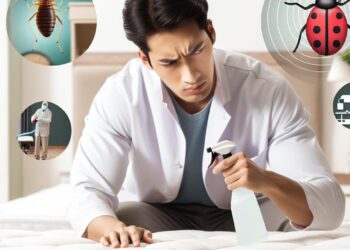Ever found yourself sharing your kitchen with a line of tiny invaders? Yep, ants can be quite the nuisance! Here, we’re diving into a natural, eco-friendly way to boot those pesky guests out of your home using baking soda. Surprisingly effective, this method is not only safe for your family and pets but also gentle on the environment. Ants can cause more than just a tickling annoyance in your pantry; they can damage property and potentially spread bacteria. Our blog is here to arm you with easy, practical solutions to protect your home—peace of mind served naturally!
Understanding Natural Ant Control with Baking Soda
Ants are tiny creatures that can become quite a nuisance in your home. To tackle this issue naturally, many folks turn to baking soda, a common household item. Baking soda works wonders because it disrupts the ants’ digestive system. Ants ingest a mix of baking soda and another agent like sugar, and, poof, it spells trouble for them. These pesky pests often hang out in kitchens, bathrooms, and gardens, where food and water are plentiful. They’re social insects, living in colonies with a highly organized structure. Spotting an infestation might be easier than you think. You’ve got those telltale trails of marching ants, searching for their next meal. You might also notice small piles of dirt near crevices or soft scratching noises within walls. Don’t forget the occasional unpleasant smell, thanks to certain ant species. Quickly addressing these signs is key to preventing any further spread and keeping your home ant-free.Watch Out: Common Pitfalls When Using Baking Soda for Ant Control
Are pesky pests disrupting the harmony of your home? You’re definitely not alone. Whether it’s ants making a trail across your kitchen counter or mice having a party in your attic, dealing with pests is a common challenge. But fret not! There are effective ways to combat these intruders without turning your home into a chemical warfare zone. Let’s delve into some handy tips and tricks that can make a real difference in your pest control efforts. 1. Keeping Ants at Bay Ants are those tiny, uninvited guests that seem to appear out of nowhere. To tackle them naturally, many folks swear by the power of baking soda. Here’s how it works: mix equal parts of baking soda and sugar – the sugar attracts the ants, and when they consume the baking soda, it disrupts their natural chemistry. Clever, isn’t it? Place this mixture in areas where you frequently spot ants, like near windowsills or along baseboards, and watch them disappear. The natural ingredients mean you’re not introducing harsh chemicals into your living space, which is a win for your family’s health. 2. The Hazard of Pests While it’s great to get ants out of your home, it’s crucial to understand the problems these little creatures can cause if left unchecked. Here are the common issues associated with pest infestations:- Structural Damage: Pests like termites quietly gnaw away at wooden structures, potentially compromising your home’s integrity. And nobody wants a creaking floor or worse, do they?
- Health Risks: Some pests can carry diseases, which they may transmit to humans, posing real health threats. It’s more than just an annoyance when pests invade.
- Food Contamination: Ants and cockroaches love food as much as we do, their presence can lead to contamination of food stores, leading to wastage and potential health risks.
- Property Devaluation: Persistent pest problems can lower the overall value of your property. Imagine trying to sell your home with roaches as housemates!
- Damage to Pets and Gardens: Some pests might not harm you directly but can cause distress to your pets or wreak havoc on your lovely garden.
- Mental Stress: Constantly dealing with pests can lead to increased stress and anxiety, affecting your peace of mind.
– Maintain Cleanliness: Regularly clean countertops, floors, and other surfaces where food particles might accumulate. They say that cleanliness is next to ant-lessness!
– Store Food Properly: Ensure food is stored in airtight containers, making it less attractive to pests. We wouldn’t want to tempt those creatures with a buffet!
– Outdoor Maintenance: Trim your garden, keep away standing water, and make sure there’s no debris piled up around your house. Pests love cluttered, damp spaces.
– Regular Inspections: Conduct routine checks of your property both inside and outside to catch any early signs of pest activity.
By integrating these simple yet effective practices into your daily routine, you can drastically reduce the likelihood of facing a pest problem. Prevention is, indeed, better than cure. Pest control is about maintaining a balance, ensuring that your space remains yours, and not a haven for little invaders. While DIY solutions like baking soda for ants can work wonders, always be ready to escalate the matter if needed. Remember, taking early action is key to keeping your home safe and sound! With a bit of vigilance, you can reclaim your castle from those tiny troublemakers. Ready to give it a go? Let’s boot those pests out for good!
Effective Home Remedies: Using Baking Soda to Banish Ants Naturally
- Baking Soda and Sugar: Mix equal parts of baking soda and sugar and sprinkle the mixture in areas where ants are frequently seen. The sugar will attract the ants, while the baking soda disrupts their digestive systems. This method is non-toxic and safe for pets and children.
- Essential Oils: Oils such as peppermint, tea tree, and eucalyptus can deter ants with their strong scents. Add a few drops to a cotton ball and wipe along ant trails. It’s a fragrant and simple method to keep ants at bay.
- Vinegar Solution: Combine equal parts of white vinegar and water in a spray bottle. Spray directly on ant trails and entry points. Vinegar disrupts the ant’s scent trails, making it hard for them to find their way back.
- Herbs like Mint: Planting mint around your home’s perimeter or placing dried mint leaves near entry points can repel ants. It’s a natural barrier and adds a pleasant aroma to your surroundings.
- Lemon Juice: Squeeze fresh lemon juice and wipe or spray it in areas prone to ant activity. The acidity and citrus scent can deter ants from entering.
- Diatomaceous Earth (DE): Sprinkle food-grade DE around entry points. It’s effective in damaging ants’ exoskeletons, helping to drop their numbers without harmful chemicals. However, always ensure safety by using food-grade and not inhaling it.
- Nematodes: These are natural predators for ants. They are tiny organisms that can be introduced into the soil to hunt ant larvae. It’s an eco-friendly solution that appeals to those preferring biological control methods.
Comparing baking soda with chemical treatments for ant control.
Looking to tackle pesky ants with a more direct approach? While natural methods are great, sometimes you need a bit of extra power. Here are some chemical treatment options that can help get rid of ants in your home:
- Boric Acid: This is a time-tested solution for ant infestations. Sprinkle boric acid near entry points and areas where you notice ant activity. It works by disrupting their digestive systems, leading to their demise.
- Fipronil: Available in various commercial products, fipronil is effective in small doses. Apply it around the foundation of your home or directly into their nests. This chemical interferes with the ants’ central nervous system, causing them to succumb quickly.
- Hydramethylnon: Commonly found in ant baits, hydramethylnon is attractive to ants due to its sweet scent. Place these baits where ants are active. The ants take the bait back to their colony, eradicating them from the inside.
- Imidacloprid: Also found in a variety of ant control products, imidacloprid disrupts nerve signals in insects. Apply it in areas where ants are frequently seen. It’s particularly effective because ants carry it back to their nests, spreading it through the colony.
Effective Prevention Tips: Keeping Ants Away Naturally at Home
It’s important to stay on top of potential pest problems before they become absolute nightmares. An effective way to ensure your home stays pest-free is by adopting prevention strategies. Here’s a structured list to guide you through:- Proper Waste Disposal and Cleanliness: Keep your home tidy and dispose of rubbish regularly. Pests like rodents and cockroaches are attracted to leftover food and rubbish bins.
- Sealing Entry Points and Cracks: Regularly inspect your home for cracks and holes that might serve as entry points for pests. Use caulk or other appropriate materials to seal them.
- Using Pest Deterrents: Install screens on windows and doors to prevent pests from entering. Consider using natural deterrents like essential oils or herbs, which can be effective and non-toxic.
- Regular Inspections and Maintenance: Schedule regular inspections for signs of pests. Look for droppings, nest materials, or unusual smells. If needed, consult professional pest control services for a thorough check.
- Garden Maintenance: Keep your garden neat and remove any debris, as these can attract pests. Trim trees and bushes to keep them from touching your house, preventing easy access to pests.
- Proper Food Storage: Store food items in airtight containers to keep them safe from pests. Ensure your pantry is clean and free of crumbs.
- Check for Leaks: Fix any leaks promptly, as moisture can attract pests like termites and mould-producing insects.
- Pet Care: If you have pets, make sure their bowls are clean and food is not left out for too long, as this can attract pests like ants or flies.
Myths & Truths: Using Baking Soda to Banish Ants
| Myth | Fact |
|---|---|
| Baking soda alone can kill ants instantly. | While baking soda can be effective, it’s not an instant solution and works better when combined with other methods, like sugar lures, to attract ants. |
| Ants will eat baking soda because they’re attracted to it. | Ants are not naturally attracted to baking soda. Mixing it with sugar or a sweet substance increases effectiveness by luring ants to the mixture. |
| Once you use baking soda, ants won’t return. | Baking soda can help manage ants but doesn’t guarantee they won’t return. Ongoing prevention and multiple methods are needed for lasting results. |
| All types of ants react the same way to baking soda. | Different ant species have varying reactions. Some may be more resistant, requiring alternate approaches alongside baking soda. |
| Baking soda is harmful to gardens and plants. | Baking soda is generally safe for plants and gardens when used in moderation and shouldn’t cause significant harm when tackling ant issues. |















